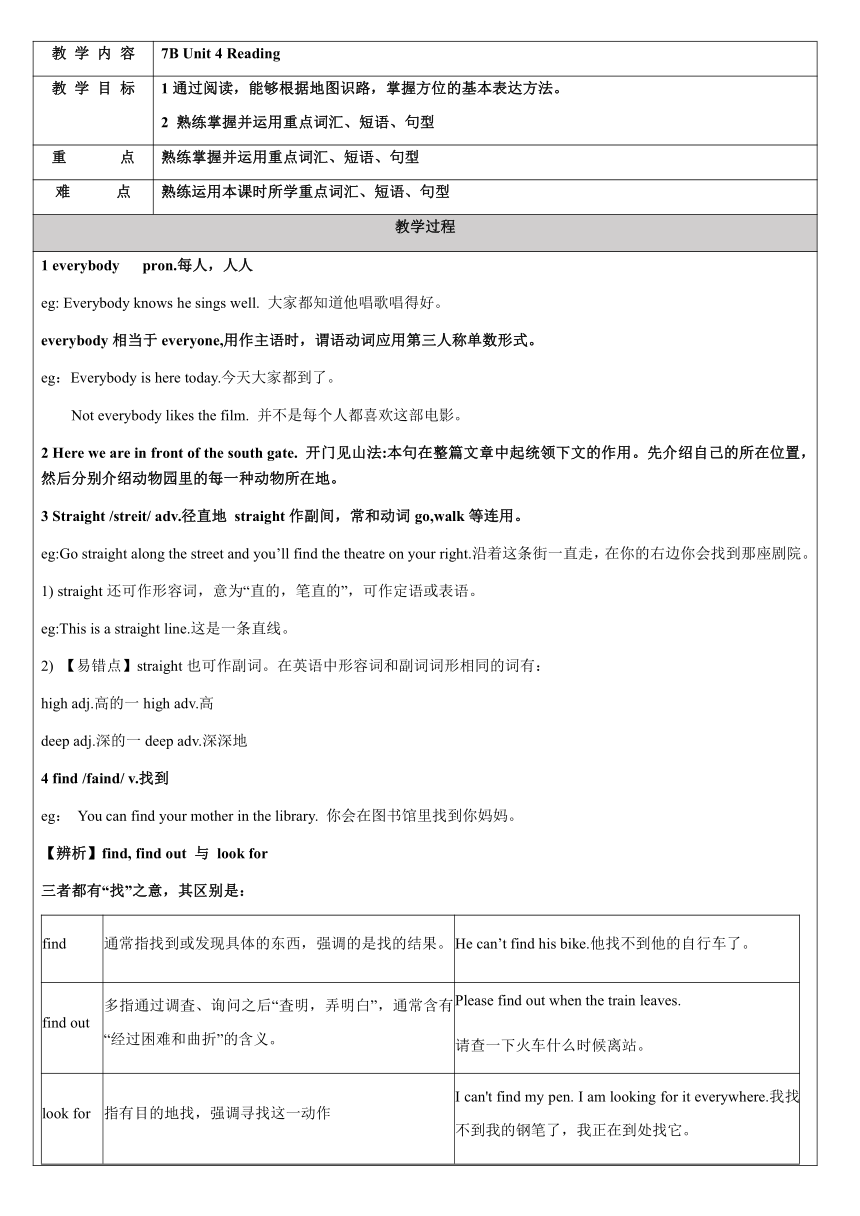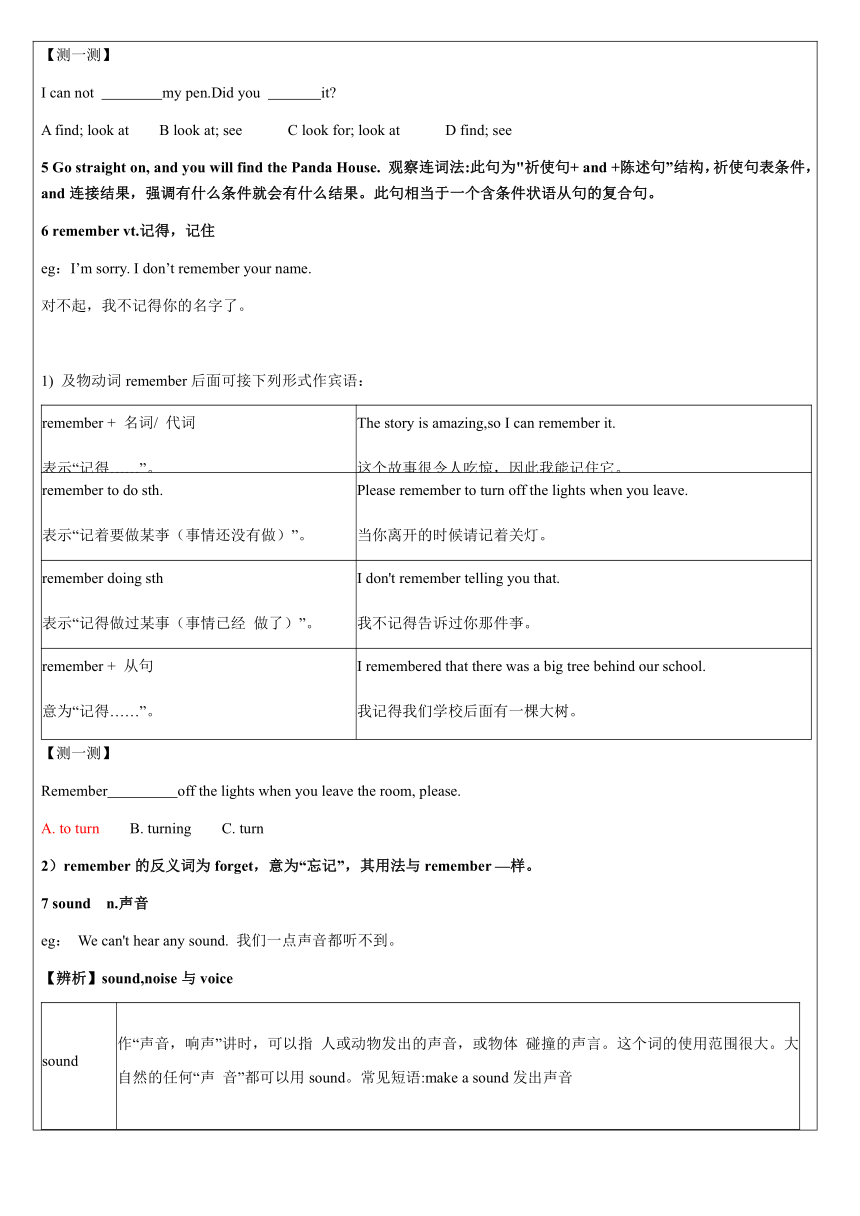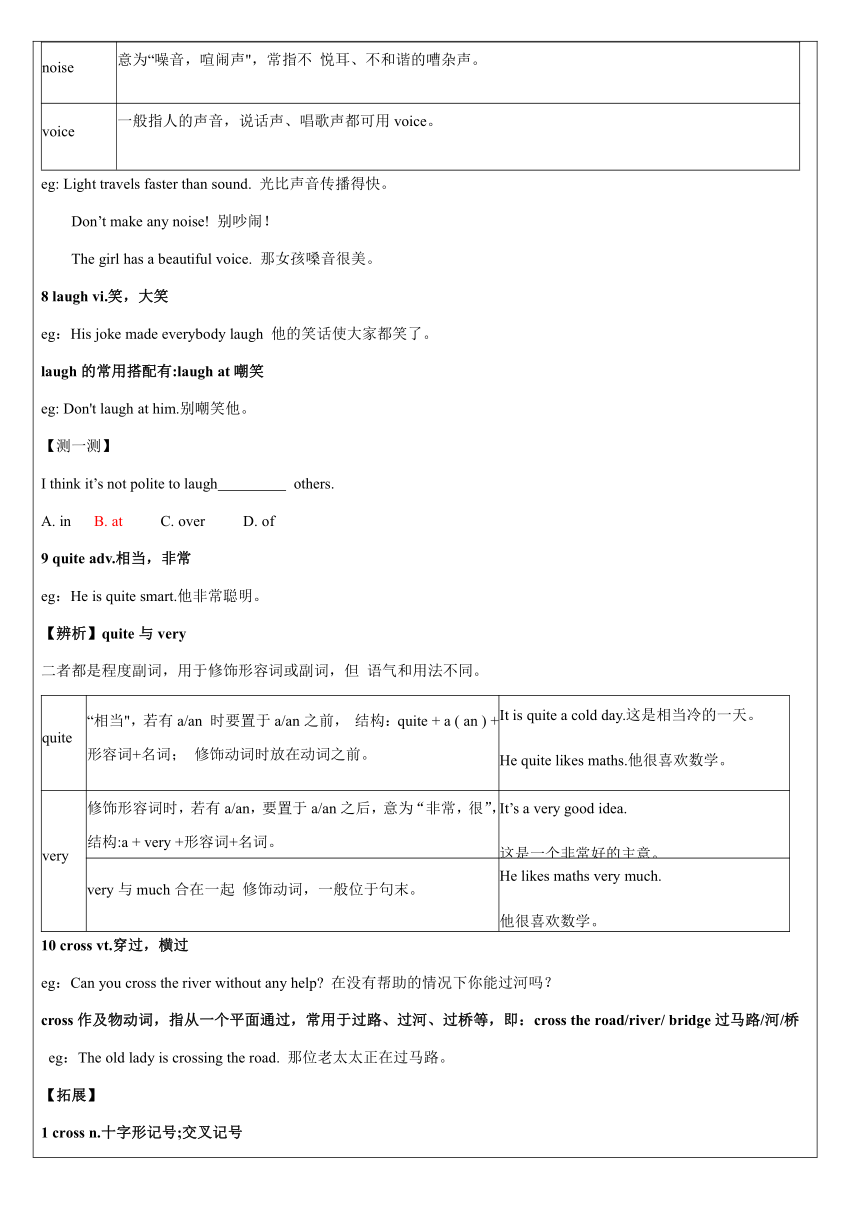Unit 4 Finding your way Reading 讲义(含答案) 2023-2024学年牛津译林版英语七年级下册
文档属性
| 名称 | Unit 4 Finding your way Reading 讲义(含答案) 2023-2024学年牛津译林版英语七年级下册 |

|
|
| 格式 | docx | ||
| 文件大小 | 28.8KB | ||
| 资源类型 | 教案 | ||
| 版本资源 | 牛津译林版 | ||
| 科目 | 英语 | ||
| 更新时间 | 2024-06-18 22:37:28 | ||
图片预览



文档简介
教 学 内 容 7B Unit 4 Reading
教 学 目 标 1通过阅读,能够根据地图识路,掌握方位的基本表达方法。 2 熟练掌握并运用重点词汇、短语、句型
重 点 熟练掌握并运用重点词汇、短语、句型
难 点 熟练运用本课时所学重点词汇、短语、句型
教学过程
1 everybody pron.每人,人人 eg: Everybody knows he sings well. 大家都知道他唱歌唱得好。 everybody相当于everyone,用作主语时,谓语动词应用第三人称单数形式。 eg:Everybody is here today.今天大家都到了。 Not everybody likes the film. 并不是每个人都喜欢这部电影。 2 Here we are in front of the south gate. 开门见山法:本句在整篇文章中起统领下文的作用。先介绍自己的所在位置,然后分别介绍动物园里的每一种动物所在地。 3 Straight /streit/ adv.径直地 straight作副间,常和动词go,walk等连用。 eg:Go straight along the street and you’ll find the theatre on your right.沿着这条街一直走,在你的右边你会找到那座剧院。 1) straight还可作形容词,意为“直的,笔直的”,可作定语或表语。 eg:This is a straight line.这是一条直线。 2) 【易错点】straight也可作副词。在英语中形容词和副词词形相同的词有: high adj.高的一high adv.高 deep adj.深的一deep adv.深深地 4 find /faind/ v.找到 eg: You can find your mother in the library. 你会在图书馆里找到你妈妈。 【辨析】find, find out 与 look for 三者都有“找”之意,其区别是: find通常指找到或发现具体的东西,强调的是找的结果。He can’t find his bike.他找不到他的自行车了。find out多指通过调査、询问之后“査明,弄明白”,通常含有 “经过困难和曲折”的含义。Please find out when the train leaves. 请查一下火车什么时候离站。look for指有目的地找,强调寻找这一动作I can't find my pen. I am looking for it everywhere.我找不到我的钢笔了,我正在到处找它。
【测一测】 I can not my pen.Did you it A find; look at B look at; see C look for; look at D find; see 5 Go straight on, and you will find the Panda House. 观察连词法:此句为"祈使句+ and +陈述句”结构,祈使句表条件,and连接结果,强调有什么条件就会有什么结果。此句相当于一个含条件状语从句的复合句。 6 remember vt.记得,记住 eg:I’m sorry. I don’t remember your name. 对不起,我不记得你的名字了。 1) 及物动词remember后面可接下列形式作宾语: remember + 名词/ 代词 表示“记得……”。The story is amazing,so I can remember it. 这个故事很令人吃惊,因此我能记住它。remember to do sth. 表示“记着要做某亊(事情还没有做)”。Please remember to turn off the lights when you leave. 当你离开的时候请记着关灯。remember doing sth 表示“记得做过某事(事情已经 做了)”。I don't remember telling you that. 我不记得告诉过你那件亊。remember + 从句 意为“记得……”。I remembered that there was a big tree behind our school. 我记得我们学校后面有一棵大树。
【测一测】 Remember off the lights when you leave the room, please. A. to turn B. turning C. turn 2)remember的反义词为forget,意为“忘记”,其用法与remember —样。 7 sound n.声音 eg: We can't hear any sound. 我们一点声音都听不到。 【辨析】sound,noise与voice sound作“声音,响声”讲时,可以指 人或动物发出的声音,或物体 碰撞的声言。这个词的使用范围很大。大自然的任何“声 音”都可以用sound。常见短语:make a sound发出声音noise意为“噪音,喧闹声",常指不 悦耳、不和谐的嘈杂声。voice一般指人的声音,说话声、唱歌声都可用voice。
eg: Light travels faster than sound. 光比声音传播得快。 Don’t make any noise! 别吵闹! The girl has a beautiful voice. 那女孩嗓音很美。 8 laugh vi.笑,大笑 eg:His joke made everybody laugh 他的笑话使大家都笑了。 laugh的常用搭配有:laugh at嘲笑 eg: Don't laugh at him.别嘲笑他。 【测一测】 I think it’s not polite to laugh others. A. in B. at C. over D. of 9 quite adv.相当,非常 eg:He is quite smart.他非常聪明。 【辨析】quite与very 二者都是程度副词,用于修饰形容词或副词,但 语气和用法不同。 quite“相当",若有a/an 时要置于a/an之前, 结构:quite + a ( an ) +形容词+名词; 修饰动词时放在动词之前。It is quite a cold day.这是相当冷的一天。 He quite likes maths.他很喜欢数学。very修饰形容词时,若有a/an,要置于a/an之后,意为“非常,很”,结构:a + very +形容词+名词。It’s a very good idea. 这是一个非常好的主意。very与much合在一起 修饰动词,一般位于句末。He likes maths very much. 他很喜欢数学。
10 cross vt.穿过,横过 eg:Can you cross the river without any help 在没有帮助的情况下你能过河吗? cross作及物动词,指从一个平面通过,常用于过路、过河、过桥等,即:cross the road/river/ bridge过马路/河/桥 eg:The old lady is crossing the road. 那位老太太正在过马路。 【拓展】 1 cross n.十字形记号;交叉记号 eg:The cross on the map shows where our house is. 地图上的十字形记号显示我们的房子在哪里。 2.crossing n.十字路口,人行横道 eg:Turn left at the next crossing. 在下个十字路口左转。 3.across prep.穿过 eg:The old man walked across the road carefully. 那个老人小心翼興地穿过马路。 11 Have a nice trip!结尾祝愿法:我们在写此类文章时,在结尾通常加上一两句表示祝愿的话语。 12 There are also birds,aren’t there 也有鸟,是吗? 1)该句为反意疑问句,由陈述句加附加问句构成,征询对前而陈述句所陈述事情的意见,或者希望事实得到证实。其结构一般为 “前肯定,后否定”或“前否定,后肯定”。 eg: You like sports, don't you 你喜欢运动,是不是? 【测一测】 There is something wrong with the radio.(改为反义疑问句) There is something wrong with the radio, ? 2) 对于“前否定,后背定”结构的回答,要按照事情本身的情况去回答。翻译时yes译为 “不",no译为“是”。 eg:—You didn’t attend the meeting,did you 你没参加会议,是吧? —No,I didn't./ Yes,I did. 是的,我没参加。/不,我参加了。 【测一测】 一Sam didn't go to school yesterday, did he — . He was ill yesterday. A. Yes,he did B. No,he did C. No,he didn’t D. Yes,he didn’t 随堂练习 一、根据汉语提示完成句子 1.We would like (每个人)to bring their own food. 2.Walk (径直地)on,and you’ll find the museum on your right. 3.The man in black (穿过)the street and goes into a supermarket. 4.This story is very interesting. It makes all of us (大笑). 5.1 like to sit on a (竹)chair in the hot summer. 二、用所给词的适当形式填空 6.The tree has green (leaf) all year round. 7.There are strange (sound) coming from the next room. 8.I like monkeys best because they are clever and (fun). 9. ( giraffe ) come from Africa, and pandas are from China. 10.I enjoy listening to music. It can make me (feel) happy. 三、单项选择 11.1 think everybody to watch TV. A. like B. likes C. liking D. enjoy 12. This is fantastic film. A. very B very a C. quite a D. a quite 13.My sister her cat yesterday, but she didn’t it. A.found ;look for B.looked; found C.looked for;find 14.—Remember to my daughter’s dance show next Friday. —Of course I will. I’ll never forget her dance for the first time last year. A.to come; to see B.coming; to see C.to come; seeing D.coming; seeing 15.一It’s Father’s Day, 一Yes. Let's buy a gift for Dad. A. isn’t it B. doesn't it C. isn’t he D. doesn’t he 四、根据汉语完成句子 16.当你穿过马路时,你会发现一个超市。 When you ,you’ll a supermarket. 17.一直往前走,然后向左拐进人格林大街。 Go . Then Green Street. 18.当鸟儿唱歌时,它们发出美妙的声音。 Birds when they sing. 19.熊猫喜欢吃竹子,整天躺着。 Pandas like lo eat bamboo and . 20.猴子总是跳来跳去,使人们大笑。 Monkeys always . They people .
isn't there
Period 2:Reading
-,1.everyone 2.straight 3.crosses 4.laugh 5.bamboo
二,6.leaves 点拨:树上不是一片叶子,故用复数。
7.sounds 8.funny 9..Giraffes 10.feel
三,11.B 点拨:本题用语法判断法。 every-body 作主语时,谓语动词用第三人称单数形式。
12.C
13.C 点拨:look for意为“寻找”,强调动作;find 意为“找到,发现”,强调结果。 根据句意可知应选C.
14.C 点拨:考查 remember和forget 的用法. remember doing something 意思是“记得做过某事(做了)”,remember to dosomething意思是“记得要做某事(未
做)".forget doing something 意思是“忘
记做过某事(做了)”,而 forget to dosomething意思是“忘记要做某事(未做)".由题意可知选C.
15.A 点拨:本题用句式分析法。 考査反意疑问句的用法。 根据反意疑问句的句式结构“前肯后否”和主语It可知正确答案选A.
四 ,16.cross the road;find
17.straight on;turn left into
18.make beautiful sounds
19.lie down all day long
20.jump around;make;laugh
教 学 目 标 1通过阅读,能够根据地图识路,掌握方位的基本表达方法。 2 熟练掌握并运用重点词汇、短语、句型
重 点 熟练掌握并运用重点词汇、短语、句型
难 点 熟练运用本课时所学重点词汇、短语、句型
教学过程
1 everybody pron.每人,人人 eg: Everybody knows he sings well. 大家都知道他唱歌唱得好。 everybody相当于everyone,用作主语时,谓语动词应用第三人称单数形式。 eg:Everybody is here today.今天大家都到了。 Not everybody likes the film. 并不是每个人都喜欢这部电影。 2 Here we are in front of the south gate. 开门见山法:本句在整篇文章中起统领下文的作用。先介绍自己的所在位置,然后分别介绍动物园里的每一种动物所在地。 3 Straight /streit/ adv.径直地 straight作副间,常和动词go,walk等连用。 eg:Go straight along the street and you’ll find the theatre on your right.沿着这条街一直走,在你的右边你会找到那座剧院。 1) straight还可作形容词,意为“直的,笔直的”,可作定语或表语。 eg:This is a straight line.这是一条直线。 2) 【易错点】straight也可作副词。在英语中形容词和副词词形相同的词有: high adj.高的一high adv.高 deep adj.深的一deep adv.深深地 4 find /faind/ v.找到 eg: You can find your mother in the library. 你会在图书馆里找到你妈妈。 【辨析】find, find out 与 look for 三者都有“找”之意,其区别是: find通常指找到或发现具体的东西,强调的是找的结果。He can’t find his bike.他找不到他的自行车了。find out多指通过调査、询问之后“査明,弄明白”,通常含有 “经过困难和曲折”的含义。Please find out when the train leaves. 请查一下火车什么时候离站。look for指有目的地找,强调寻找这一动作I can't find my pen. I am looking for it everywhere.我找不到我的钢笔了,我正在到处找它。
【测一测】 I can not my pen.Did you it A find; look at B look at; see C look for; look at D find; see 5 Go straight on, and you will find the Panda House. 观察连词法:此句为"祈使句+ and +陈述句”结构,祈使句表条件,and连接结果,强调有什么条件就会有什么结果。此句相当于一个含条件状语从句的复合句。 6 remember vt.记得,记住 eg:I’m sorry. I don’t remember your name. 对不起,我不记得你的名字了。 1) 及物动词remember后面可接下列形式作宾语: remember + 名词/ 代词 表示“记得……”。The story is amazing,so I can remember it. 这个故事很令人吃惊,因此我能记住它。remember to do sth. 表示“记着要做某亊(事情还没有做)”。Please remember to turn off the lights when you leave. 当你离开的时候请记着关灯。remember doing sth 表示“记得做过某事(事情已经 做了)”。I don't remember telling you that. 我不记得告诉过你那件亊。remember + 从句 意为“记得……”。I remembered that there was a big tree behind our school. 我记得我们学校后面有一棵大树。
【测一测】 Remember off the lights when you leave the room, please. A. to turn B. turning C. turn 2)remember的反义词为forget,意为“忘记”,其用法与remember —样。 7 sound n.声音 eg: We can't hear any sound. 我们一点声音都听不到。 【辨析】sound,noise与voice sound作“声音,响声”讲时,可以指 人或动物发出的声音,或物体 碰撞的声言。这个词的使用范围很大。大自然的任何“声 音”都可以用sound。常见短语:make a sound发出声音noise意为“噪音,喧闹声",常指不 悦耳、不和谐的嘈杂声。voice一般指人的声音,说话声、唱歌声都可用voice。
eg: Light travels faster than sound. 光比声音传播得快。 Don’t make any noise! 别吵闹! The girl has a beautiful voice. 那女孩嗓音很美。 8 laugh vi.笑,大笑 eg:His joke made everybody laugh 他的笑话使大家都笑了。 laugh的常用搭配有:laugh at嘲笑 eg: Don't laugh at him.别嘲笑他。 【测一测】 I think it’s not polite to laugh others. A. in B. at C. over D. of 9 quite adv.相当,非常 eg:He is quite smart.他非常聪明。 【辨析】quite与very 二者都是程度副词,用于修饰形容词或副词,但 语气和用法不同。 quite“相当",若有a/an 时要置于a/an之前, 结构:quite + a ( an ) +形容词+名词; 修饰动词时放在动词之前。It is quite a cold day.这是相当冷的一天。 He quite likes maths.他很喜欢数学。very修饰形容词时,若有a/an,要置于a/an之后,意为“非常,很”,结构:a + very +形容词+名词。It’s a very good idea. 这是一个非常好的主意。very与much合在一起 修饰动词,一般位于句末。He likes maths very much. 他很喜欢数学。
10 cross vt.穿过,横过 eg:Can you cross the river without any help 在没有帮助的情况下你能过河吗? cross作及物动词,指从一个平面通过,常用于过路、过河、过桥等,即:cross the road/river/ bridge过马路/河/桥 eg:The old lady is crossing the road. 那位老太太正在过马路。 【拓展】 1 cross n.十字形记号;交叉记号 eg:The cross on the map shows where our house is. 地图上的十字形记号显示我们的房子在哪里。 2.crossing n.十字路口,人行横道 eg:Turn left at the next crossing. 在下个十字路口左转。 3.across prep.穿过 eg:The old man walked across the road carefully. 那个老人小心翼興地穿过马路。 11 Have a nice trip!结尾祝愿法:我们在写此类文章时,在结尾通常加上一两句表示祝愿的话语。 12 There are also birds,aren’t there 也有鸟,是吗? 1)该句为反意疑问句,由陈述句加附加问句构成,征询对前而陈述句所陈述事情的意见,或者希望事实得到证实。其结构一般为 “前肯定,后否定”或“前否定,后肯定”。 eg: You like sports, don't you 你喜欢运动,是不是? 【测一测】 There is something wrong with the radio.(改为反义疑问句) There is something wrong with the radio, ? 2) 对于“前否定,后背定”结构的回答,要按照事情本身的情况去回答。翻译时yes译为 “不",no译为“是”。 eg:—You didn’t attend the meeting,did you 你没参加会议,是吧? —No,I didn't./ Yes,I did. 是的,我没参加。/不,我参加了。 【测一测】 一Sam didn't go to school yesterday, did he — . He was ill yesterday. A. Yes,he did B. No,he did C. No,he didn’t D. Yes,he didn’t 随堂练习 一、根据汉语提示完成句子 1.We would like (每个人)to bring their own food. 2.Walk (径直地)on,and you’ll find the museum on your right. 3.The man in black (穿过)the street and goes into a supermarket. 4.This story is very interesting. It makes all of us (大笑). 5.1 like to sit on a (竹)chair in the hot summer. 二、用所给词的适当形式填空 6.The tree has green (leaf) all year round. 7.There are strange (sound) coming from the next room. 8.I like monkeys best because they are clever and (fun). 9. ( giraffe ) come from Africa, and pandas are from China. 10.I enjoy listening to music. It can make me (feel) happy. 三、单项选择 11.1 think everybody to watch TV. A. like B. likes C. liking D. enjoy 12. This is fantastic film. A. very B very a C. quite a D. a quite 13.My sister her cat yesterday, but she didn’t it. A.found ;look for B.looked; found C.looked for;find 14.—Remember to my daughter’s dance show next Friday. —Of course I will. I’ll never forget her dance for the first time last year. A.to come; to see B.coming; to see C.to come; seeing D.coming; seeing 15.一It’s Father’s Day, 一Yes. Let's buy a gift for Dad. A. isn’t it B. doesn't it C. isn’t he D. doesn’t he 四、根据汉语完成句子 16.当你穿过马路时,你会发现一个超市。 When you ,you’ll a supermarket. 17.一直往前走,然后向左拐进人格林大街。 Go . Then Green Street. 18.当鸟儿唱歌时,它们发出美妙的声音。 Birds when they sing. 19.熊猫喜欢吃竹子,整天躺着。 Pandas like lo eat bamboo and . 20.猴子总是跳来跳去,使人们大笑。 Monkeys always . They people .
isn't there
Period 2:Reading
-,1.everyone 2.straight 3.crosses 4.laugh 5.bamboo
二,6.leaves 点拨:树上不是一片叶子,故用复数。
7.sounds 8.funny 9..Giraffes 10.feel
三,11.B 点拨:本题用语法判断法。 every-body 作主语时,谓语动词用第三人称单数形式。
12.C
13.C 点拨:look for意为“寻找”,强调动作;find 意为“找到,发现”,强调结果。 根据句意可知应选C.
14.C 点拨:考查 remember和forget 的用法. remember doing something 意思是“记得做过某事(做了)”,remember to dosomething意思是“记得要做某事(未
做)".forget doing something 意思是“忘
记做过某事(做了)”,而 forget to dosomething意思是“忘记要做某事(未做)".由题意可知选C.
15.A 点拨:本题用句式分析法。 考査反意疑问句的用法。 根据反意疑问句的句式结构“前肯后否”和主语It可知正确答案选A.
四 ,16.cross the road;find
17.straight on;turn left into
18.make beautiful sounds
19.lie down all day long
20.jump around;make;laugh
